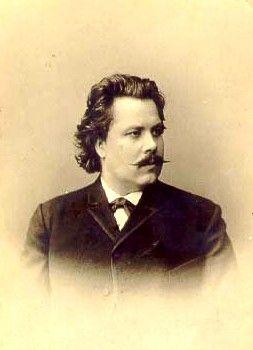Donskoj was born during August 1857 (or 1858) in Ushilovo in the district of Chukhloma in Kostroma province.
His father was a peasant.
Since 1872, he worked first as a fishmonger then as a house painter in St Petersburg.
Donskoj's fate changed when by accident he met the ballet dancer N. O. Golts, who arranged for him to
sing in a choir and then introduced him to professional singers, and those, having heard his voice,
took care of his musical education at the advice of Golts.
His first teacher was A. Melnikov who prepared him to enter the St. Petersburg conservatory. From 1877 to 1880, Donskoj
studied at the conservatory in the classes of Everardi and V. Samus.
As Donskoj was poor and could not pay for his studies, he was given an an allowance. Since 1880, he continued
his studies at the Free Music School, founded by Balakirev, Borodin, Cui, Musorgskij and Rimskij-Korsakov,
under D. M. Leonovoj and M. Musorgskij. He was one of Musorgskij's last pupils.
At that time, he started his stage activity: sang in concerts
and as chorister at the Mariinskij.
In 1888, he perfected his skills in Milan with G. Ronconi and Gambrogio.
In 1882, he made his Kiev debut with the I. Ja. Setov company as Sobinin.
In 1883, he was invited to join the Bolshoj, where he stayed until 1904, becoming a leading tenor.
He simultaneously continued his vocal training with F. P. Komissarzhevskij and later with K. I. Krzyzanowski.
He also took lessons in stage craftsmanship.
During his tenure at the Bolshoj, Donskoj toured with the A. A. Eichenwald (brother of his wife) company:
Nizhnij Novgorod – 1898, August 1902, 1903; Kazan – 1902.
In 1904, after leaving the Bolshoj, Donskoj formed his own company that lasted until 1908. The company toured
Saratov, Tiflis and Siberian cities. 1904–06, the company was based in Tiflis.
Starting in 1905, he taught singing. After buying an estate in Girino in the Tver province, Donskoj organized an
operatic studio in summer there for the thorough study of operatic works. The studio had a boarding house. This was the only studio of
its kind in Russia. Among the guests and spectators were the Moscow creative intelligentsia, like the celebrated painter Isaak Levitan e.g.
In 1909, he received the title Honored Artist of the Imperial Theaters.
He was one of the best opera singers of his time, whose success in
Moscow could be compared to the success of Figner in Saint Petersburg.
Donskoj had a very busy concert life. In 1900, he appeared at the world exhibition in Paris. He sang romances
in the circles of Russian music amateurs. In 1893, he sang the solo of the Mass in C-major by Beethoven
with Evgenija Zbrueva and Margarita Eichenwald. On February 16, 1902, he took part in the first performance of the cantata "The legend
of the great city of Kitezh and the quiet lake Svetojar" by S. Vasilenko, under the baton of V. Safonov.
During his 20 year career, Donskoj sang 78 roles in 69 operas. His repertory included:
Sobinin (apparently a total of 250 times according to references),
Radames, Vseslav (Askoldova mogila/Askold's grave by A. Verstovskij), Borovskij (Nizhegorodtsy by E. Napravnik), First Rabbi (Uriel
Akosta by V. Serovoj, creator), Andrij (Taras Bulba by V. Kashperov, creator), Faust (Mefistofele, creator at the Bolshoi), Alphonse (La
muette de Portici), Grigorij, Rober (Marija Burgundskaja by Blaramberg, creator), Bastrjukov (Son na Volga by Arenskij, creator), Jurij
(Charodejka/The sorceress), Lyonel, Gérald, Nikolaj (Tushintsy by Blaramberg, creator), Rajmond (Meluzina by I. Trubetskij, creator),
Raoul, Vladimir (Dubrovskij), Roméo, Don Gomez (Henri VIII by Saint-Saëns), Vakula (Night before Christmas by Rimskij-Korsakov),
Andrej (Mazepa), Volynskij (Ledjanoj dom by A. Koreshchenko, creator), Tucha (Pskovitjanka, 3rd version), Aljosha Popovich (Dobrynja
Nikitich by Grechaninov, creator),
Alfredo,
Prince (Rusalka),
Levko (Majskaja noch),
Berendej (Snegurochka),
Lenskij,
Vagoa (Judif/Judith by Serov),
Bajan (Ruslan i Ljudmila),
Kuratov (Nizhegorodtsy),
Léopold,
Lohengrin,
Jean de Leyde,
Sinodal,
Neron,
Ruald (Rogneda by A. Serov),
Vasja (Vrazhja sila by A. Serov),
Garold (Garold/Harold by E. Napravnik),
Faust,
Vasco da Gama,
Vakula (Cherevichki),
German,
Ottavio,
Edgardo,
Arnold,
Otello, ....
In 1905, he started teaching singing. 1907–17, he was a professor at the Moscow conservatory.
His students included: V. Bystrov, P. P. Bolotin, F. Vologodskij, Boris Evlakhov, Ja. S.
Zagumennyj, N. G. Zubarev, Grigorij Pirogov, M. D. Romenskij, D. T. Sprishevskaja, A. N. Uljanov,
M. F. Shekun-Kolomijchenko, ....
His partners included:
L. F. Aleksandrov, A. I. Bartsal, I. F. Butenko, S. G. Vlasov, V. N. Gnucheva, M. A. Dejsha-Sionitskaja, A. M. Dodonov, L. Ju. Zvjagina,
M. V. Zotova, B. B. Korsov, E. A. Lavrovskaja, I. V. Machinskij, Ju. Ja. Makhina, N. V. Salina, S. E. Trezvinskij, V. S. Tjutjunnik,
P. P. Figurov, Alma Fohström, P. A. Khokhlov, Fjodor Shaljapin, Margarita Eichenwald, ...
Some of the conductors he sang with include: U. I. Avranek, I. K. Altani, A. S. Arenskij, M. Golinkin, E. F. Napravnik, Ja. Pozen, A. A.
Eichenwald, ...
Reference for the biography
